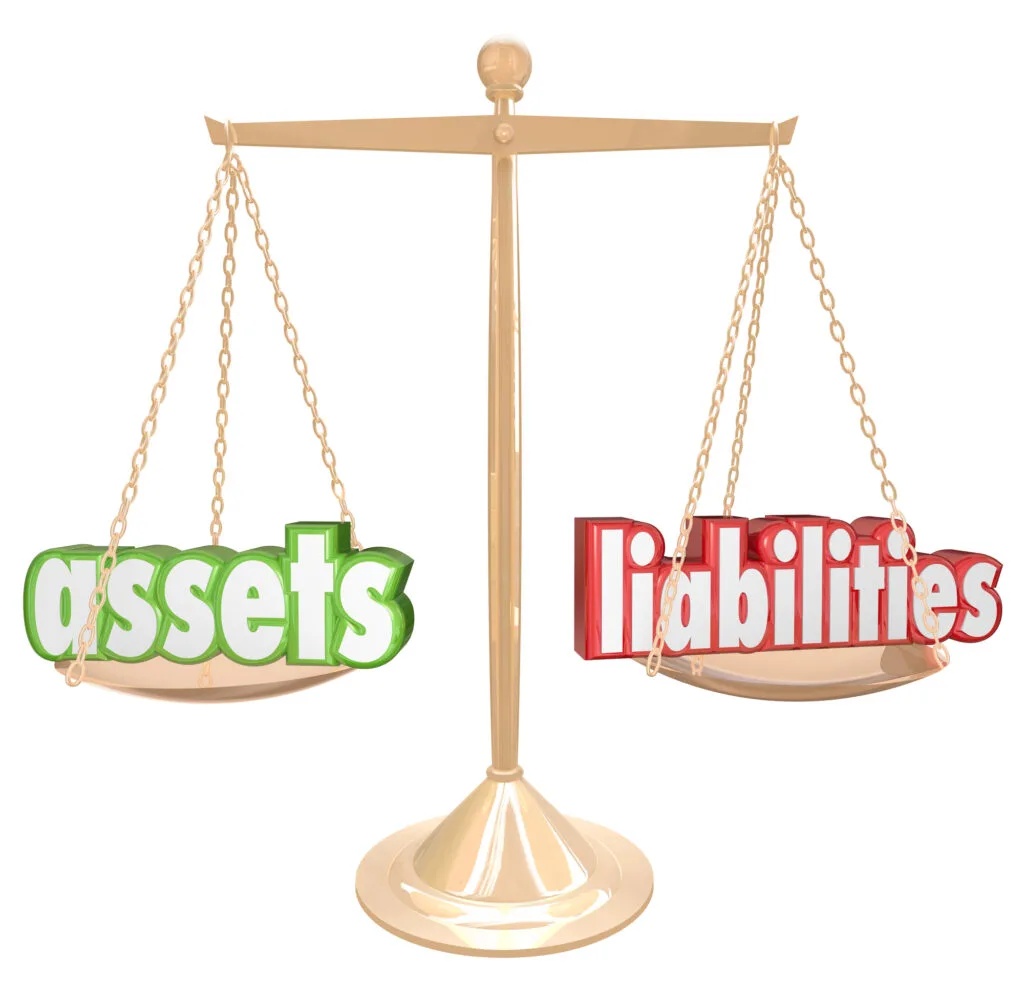If you’re reading this post, it’s probably because you’re wondering what should be net worth be at 30? And what a good question. In this post, we will dig into some statistics, some personal experience, and the ultimate answer to this question.
What Is “Net Worth”?
So before we go further, let’s talk about what your net worth even is.
Simply put, your net worth is the sum total of all your assets (property, savings, investments, etc.) minus any debts and other liabilities you may have, like credit card balances.
For example, let’s say you own a home that’s worth $200,000 and you have a mortgage of $150,000. Your net worth would be $50,000.
Now, let’s say you also have a savings account with $20,000 and a 401k worth $30,000. Your net worth would now be $100,000.
Of course, this is a very simplified example and in reality, your net worth is likely to be much more complex. But it gives you a basic idea of how to calculate it.
Why Is Net Worth Important?
Your net worth is important because it’s a snapshot of your financial health (like your credit score). It can tell you whether you’re on track to reach your financial goals or if you need to make some changes.
For example, let’s say your goal is to retire with a nest egg of $1 million. If your net worth is currently $500,000, then you know you’re on track. But if it’s only $50,000, then you know you have some work to do.
Similarly, your net worth can also show you how much debt you have and how well you’re doing at paying it off. If you have a negative net worth, it means you owe more than you own and your financial situation needs some TLC.
How To Calculate Your Net Worth
Calculating your net worth is actually pretty simple. Just follow these steps:
1. Make a list of all your assets. This includes what is in your bank account, your savings, investments, property, and anything else that has value.
2. Make a list of all your liabilities. This includes your mortgage, credit card debt, car loans, student loans, and any other debts you may have.
3. Subtract your liabilities from your assets. This will give you your net worth.
You can also use this net worth calculator here to calculate yours.

How To Track Your Net Worth
To track you net worth, you could manually use a spreadsheet or I recommend using a tool like Personal Capital to keep track of it all in one place.
I personally think the best way to track it is the one that works for you and that you’ll stick to.
What Is the Average Net Worth by Age?
Now that you know how to calculate your net worth, you’re probably wondering how it stacks up against others.
Here’s a look at the average net worth by age group, according to the Federal Reserve’s 2020 Survey of Consumer Finances:
| Age of Head of Household | Median Net Worth | Average Net Worth |
| <35 | 13,900 | 76,300 |
| 35-44 | 91,300 | 436,200 |
| 45-54 | 168,600 | 833,200 |
| 55-64 | 212,500 | 1,175,900 |
| 65-74 | 266,400 | 1,217,700 |
| 75+ | 254,800 | 977,600 |
The median number means that half of the population has a net worth below this number and half have a net worth above it.
The average number means that if you took everyone’s net worth and averaged it out, this is what you would get.
As you can see, the median net worth for someone under 35 is just $13,900. Meanwhile, the media net worth for someone over 65 is significant higher at $266,400.
The average net worth of Americans is currently $748,800. The median net worth is much lower at $121,700.
Comparing these to the averages, the average net worth for someone under 35 is $76,300. The average net worth for someone over 65 is $1,217,700.
The closer you get to retirement age, the higher your net worth will be. Once you retire, you’ll start having less money as your investments is how you will pay for your expenses.
As you can see, the median net worth generally increases with age. This makes sense because as we get older, we have more time to save and build up our assets. We also tend to have a higher income as we get older.

What Should Your Net Worth Be at 30?
As you can see, the media net worth for someone under 35 is just below $14,000. And it doesn’t really start to pick up until you reach your 40s and 50s.
Of course, these are just averages and there will always be people who have a higher or lower net worth than average. But it gives you a general idea of where you should be.
Net Worth Rule of Thumbs
While there’s no magic number that you should aim for, there are some general “rules of thumb” that can tell you if you’re on track.
One popular rule is the 70% rule.
This rule says that your net worth should be 70% of your annual income. So if you make $50,000 a year, your net worth should be $35,000.
Another rule is the 50/30/20 rule. This rule breaks down your income as follows:
– 50% goes towards essentials like housing, food, and transportation
– 30% goes towards discretionary expenses like entertainment and shopping
– 20% goes towards savings and debt payments
Under this rule, your net worth should be 20% of your annual income. So if you make $50,000 a year, your net worth should be $10,000.
Your net worth should be 1.5x your annual income at age 30.
And yet another rule of thumb, one that I personally think is the top one to consider is that your net worth should be 1.5x your annual salary at age 30.
That means if you make $100,000 a year at age 30, your net worth should be $150,000.
Of these three rules, this is the most lofty. However, I think you’ll be better off when you start with better wealth-growing habits at a younger age versus starting in your 30s or 40s.
These are just general guidelines. Your own net worth goals will depend on your unique circumstances.

How Wealth Grows – Compound Interest
To make some more sense of this, let’s look at a little principle called compound interest to illustrate how wealth grows in the long term.
Imagine you have $10,000 in the bank and you earn 5% interest on it every year.
After one year, you would have $10,500.
The next year, you would have $11,025 ($10,500 + 0.05 x $10,500).
And the year after that, you would have $11,576.25 ($11,025 + 0.05 x $11,025).
As you can see, your money starts to grow exponentially because you’re earning interest on your interest.
This is the power of compounding and it’s what makes wealth grow over time. Of course, the earlier you start, the more time you have for compounding to work its magic.
How Much Should You Save Each Month?
The answer to this question depends on a number of factors, including your age, income, and lifestyle.
A good general rule of thumb is to save 10-15% of your income each month.
If you’re just starting out, you may want to start with a smaller number like 5-10%. And if you’re further along in your career, you may be able to save more like 15-20%.
Of course, these are just general guidelines. The important thing is to start saving as soon as possible and to make it a priority in your budget.
What if You Can’t Save 10-15%?
If you can’t save 10-15% of your income each month, that’s OK. Just start with what you can and try to increase your savings rate over time.
You may also want to consider ways to increase your income so that you can save more each month. Adding passive income streams can help put you on the right track by adding additional income and increasing cash flow. This is important in your early years but can also benefit you into your retirement years as well.
For example, you could get a side hustle or invest in a business. Or you could look for ways to make more money at your day job by asking for a raise or taking on additional responsibilities. Consider starting a side hustle as part of your investment strategy. You are investing your time and talents into making money.
Saving 10-15% of your income each month may seem like a lot, but it’s important to remember that compound interest will help your money grow over time.
How To Increase Your Net Worth
Increasing your net worth is basic math. You need to increase your assets and decrease your debts if you’re hoping to see that number grow.
If you want to increase your net worth, there are a few things you can do:
1. Save more money.
This may seem obvious, but the more money you can save, the more quickly your net worth will grow. Try to put away as much money as you can each month into savings and investments.
2. Invest wisely.
Another way to grow your net worth is to invest your money wisely. This could include investing in the stock market, real estate, or other assets.
3. Pay off debt and build an emergency fund.
If you have a lot of debt, it can drag down your net worth. Try to pay off as much debt as you can so you can increase your net worth more quickly.
An emergency fund is crucial because it means that in an emergency, you won’t have to rely on lines of credit to sustain yourself and cover your expenses.
4. Live below your means.
Finally, one of the best things you can do for your net worth is to live below your means. This means spending less money than you make and saving the rest.
If you can follow these steps, you’ll be on your way to increasing your net worth in no time.

My Steps To Increasing My Net Worth
I was in my early 20s when I realized I was going to have to make some changes to my lifestyle to be able to reach my financial goals.
My husband and I wanted to pay off our $25k in student loan debt and begin saving and investing for our future.
One of the first steps we took was moving in with roommates for a year which allowed us to save $900 off of our rent per month. It was perhaps the worst of times living in that situation, however, we were able to pay off our debt and take a $10,000 trip to New Zealand the next year. So all in all, it was worth the sacrifices we made early in our marriage.
Next, we began maxing our our retirement accounts. My husband’s company offered a 401(k) match (and I have always been self-employed) and we began maxing out the account beyond that.
After that year, we decided to live in a studio apartment to continue saving more money. For many years, we saved over 60% of our income every year. We put that money into investments.
Then we began investing. Instead of sharing my personal investing strategy, I will direct you here to the resources my good friend Tori provides through her company, HerFirst$100k. There is a lot of consider with investing so be sure to check out those resources.
The bigger thing here for me, at least, was to create a budgeting system to that gave me the amount of money I wanted to invest every month.
We have target amounts to spend every month for every category. We use YNAB (You Need a Budget) to easily keep track of our spending. Also having a record of our typical spending was instrumental in figuring out what was a realistic budget for us.
Last, we increased our income. This is a big one because your savings potential is only as large as your income.
Increasing our income looked like negotiating for more money at every opportunity, considering alternate streams of income, and selling things we no longer needed instead of giving them away or donating them.
The first two make the most difference, however, I was also able to make an extra $5k from reselling things we no longer needed so don’t overlook that either!

Steps To Take To Ensure You Have a Solid Financial Foundation:
1. Know your current net worth. This is simple enough. Add up the total value of your assets and subtract any debts you may have. This will give you your starting point.
2. Set some financial goals. What do you want to achieve in the next 5, 10, or 20 years? Do you want to retire early? Buy a house? Save for your children’s education? Once you know what you want, you can start planning on how to achieve it.
3. Make a budget and stick to it. This is key to achieving any financial goal. You need to know where your money is going so you can make sure you’re not spending more than you’re bringing in.
4. Invest in yourself. This means taking the time to learn about money and investing. The more you know, the better equipped you’ll be to make wise decisions with your money.
5. Live below your means. This is perhaps the most important step of all. If you want to build wealth, you need to spend less than you earn. That means making sacrifices in your lifestyle so you can save and invest more. It’s not always easy, but it’s essential if you want to achieve financial freedom. You can still have what you want, you just have to decide that you want something over everything.
6. Stay disciplined. This is what will ultimately make or break your financial success. If you can stick to your budget, invest regularly, and resist the urge to splurge, you’ll be well on your way to financial freedom.
7. Talk with a financial advisor. For more personal finance information, consider talking to a financial advisor to make sure you’re on track. They can explain a retirement plan, discuss things like mutual funds, your total assets, advise on personal loans, discuss your investment accounts, retirement savings, and more.
Final Thoughts: What Should My Net Worth Be at 30?
If we look at just the numbers in the able above, if your net worth is above $13,900 then you are doing better than half the under 35 population.
At 30, I think your net worth should be 1.5x your annual salary.
That means if you make $30,000 per yer, your net worth should be $45,000.
If you make $60,000 per yer, your net worth should be $90,000.
Let’s say you make $150,000 per yer, your net worth should be $225,000.
If you want numbers based on data, the median net worth below age 35 is $13,900. The average net worth is $76,300. So if you are somewhere between those two numbers, you are doing well.
Your net worth is a key financial metric that you should be tracking. It shows you how much you’ve saved, how much debt you have, and how well you’re doing financially.
If you want to increase your net worth, the best things you can do are to save more money, invest wisely, pay off debt, and live below your means.
Keep track of your net worth and watch it grow over time. You’ll be glad you did.
This article is intended to be educational and does not provide financial advice.
More Posts About Life In Your 30s
- Best 225+ Turning 30 Phrases, Wishes, Messages for a 30th Birthday
- 10 Things To Look Forward To In Your 30s
- 10 Best Blogs To Read In Your 30s
- 30 Books to Read In Your 30s
- 50 Inspiring Quotes For Your 30s
- The Ultimate Bucket List For Your 30s
- Turning 30 Poems: 30 Poems For 30th Birthday Wishes
- Turning 30 Humor and Turning 30 Jokes That Will Make You Laugh
- Cheers to 30 Years: How I’m Approaching My Thirties
- How To Deal With Overbearing Parents at 30
- 30th Birthday Party Themes: 36 Ideas To Celebrate in Style
- Gifts For Women In Their 30s
- How To Get My Life Together At 30
- How To Reinvent Yourself At 30
- 50 Movies Every Woman Should Watch In Her 30s
- 200+ Smile Quotes for Instagram to Inspire You
- 30 Great Gifts For Someone Turning 30
- How To Dress In Your 30s: 21 Must-Have Style Pieces
- Being In Your 30s: Everything You Need To Know
- 40 Hairstyles For Women In Their 30s
- Being Broke at 30: What To Do About It
- Starting Over In Your 30s: Where To Go From Here
